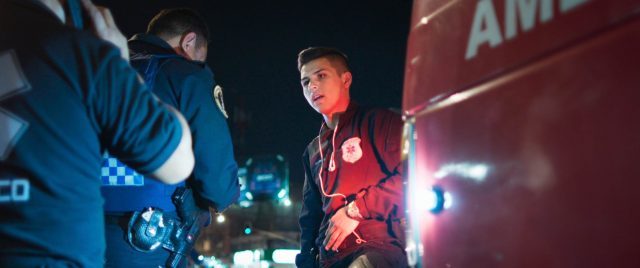
EMT Juan Ochoa deals with corrupt police in Luke Lorentzen’s Midnight Family
MIDNIGHT FAMILY (Luke Lorentzen, 2019)
Metrograph
7 Ludlow St. between Canal & Hester Sts.
Opens Friday, December 6
212-660-0312
metrograph.com
midnightfamilyfilm.com
Following nearly 120 screenings at film festivals around the world and winning more than two dozen awards, Luke Lorentzen’s spellbinding documentary Midnight Family opens December 6 for a weeklong run at Metrograph. The San Francisco–based Stanford grad initially went south of the border to make a different movie, but after meeting the Ochoa family, he quickly changed direction, embedding himself for six months over three years with Fernando (Fer) Ochoa and his two sons, Juan, who is now seventeen, and Josué, now ten, riding along with them in their private ambulance as they roam around Mexico City searching for hurt people in desperate need of assistance. The film announces at the beginning that there are only about forty-five government ambulances for nine million people in the city, so a slew of independently operated vehicles use radio scanners and police tips to race toward scenes of accidents so they can take victims to nearby hospitals and get paid for their efforts. However, they are not necessarily properly trained EMTs, and their ambulances are often not registered — the Mexican health-care system is in such disarray that there is little if any oversight anywhere — and if the people they pick up are poor, they don’t collect on the bill.
But the Ochoas, who named their business Med Care, soldier on, going out night after night. They are truly concerned about helping men, women, and children who require medical care, even if they don’t always know the best methods to treat them while speeding toward either a public or private hospital — sometimes making the decision based on whether they have a deal with that hospital to get some cash in exchange for delivering patients. There’s a good reason why it says on their ambulance: “Urgencias Basicas,” which means “basic emergencies.”
Lorentzen expertly unfolds the narrative, as the emergencies start with a broken nose and build up to much more serious health situations. It plays out like a thriller, first with the Ochoas racing through crowded streets and on sidewalks, trying to get to the accident scene before another ambulance does, then roaring to the hospital while their new passenger is still alive. Serving as producer, director, cinematographer, and editor, Lorentzen uses two Sony FS-7s, one mounted on the windshield facing in, the other either handheld or on a tripod in the back, making viewers feel like they’re in the ambulance, experiencing the breathtaking, claustrophobic nature of the Ochoas’ everyday experiences, enhanced by Matías Barberis’s immersive sound design and natural light, which is often quite beautiful, as street lamps and glowing gas stations add a magical quality to the darkness.
There are no talking heads, no experts discussing the health-care crisis, no pontificating about how bad things are. It’s just the Ochoas and their ambulance. Even when they take a break, Fer relaxes right in front of the vehicle, ready to jump into action if a call comes in. “I’d love to take just one night off to show people how screwed they’d be without us. This city would be a mess without private ambulances,” Juan says. Even with them, it’s quite a mess, as Lorentzen does not shy away from the ethical questions raised by the Ochoas’ modus operandi. But in the end, Midnight Family is a gripping and powerful look at the struggles to get quality health care and make a living in Mexico while also evoking the countless medical issues that are prevalent around the world — and in America too.